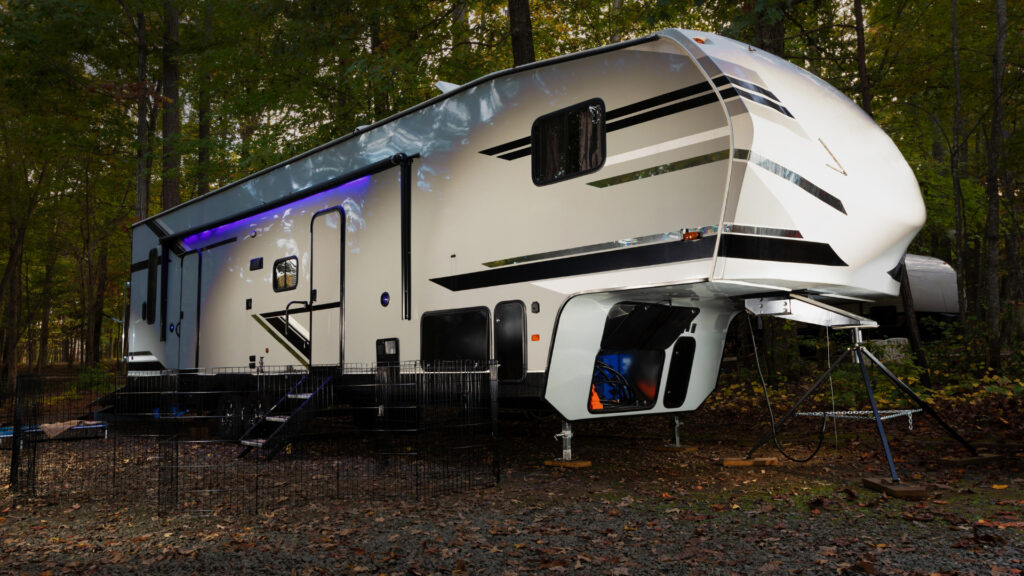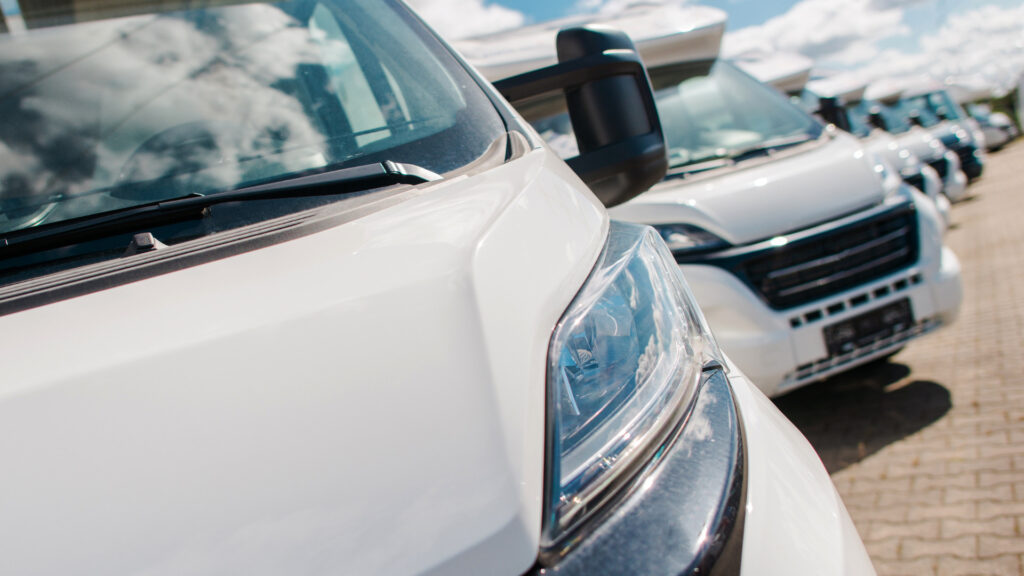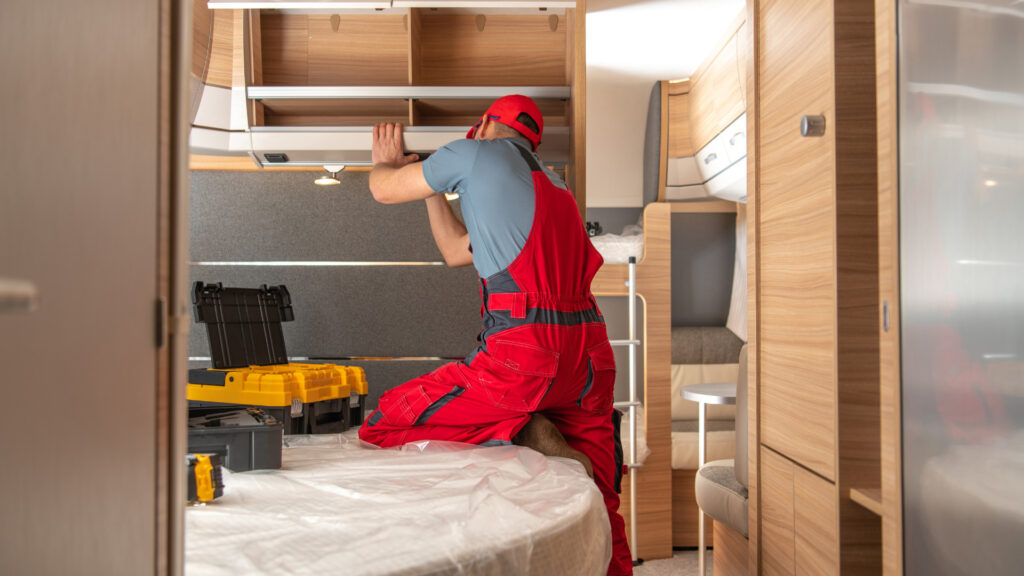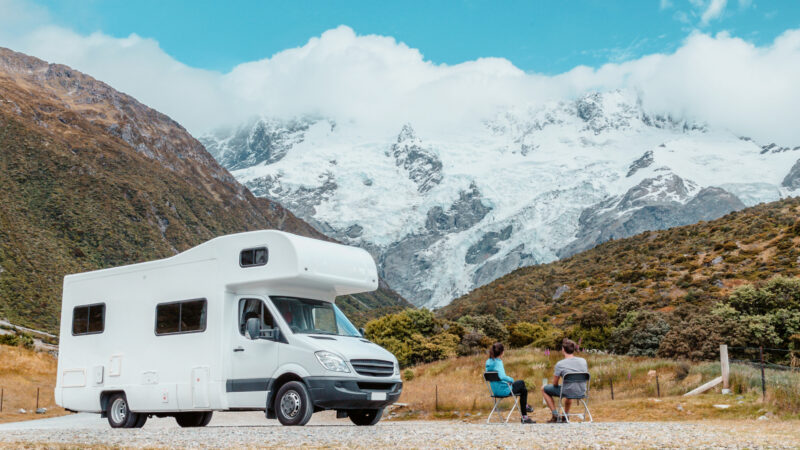Table of Contents Show
Buying an RV to live in is a significant decision that can impact your finances, relationships, and lifestyle. For some owners, it has proven to be one of the best decisions for their living situation.
Whether you plan to embrace the nomadic lifestyle or park your rig and live stationary, an RV can be a great place to call home. However, shopping looks slightly different when looking for a full-time residence instead of a weekend home.
Today, we’ll share some of the best tips for buying an RV to live in. We wish we had had these when we were shopping years ago!
Let’s get started!
Can You Live Permanently in an RV?
You can live permanently in an RV. Whether to embrace tiny living or enjoy the potential financial savings, many people choose to call an RV home. However, before moving your belongings in, check the legalities where you plan to live.
Some areas don’t consider an RV a residential dwelling. They often require on-site features like electricity, water, or waste management. Unless you have these items, you may face strict time restrictions for how long you can stay in your camper.
Do yourself a favor, and research the legalities of living permanently in an RV before getting too far along. You don’t want to make financial commitments without knowing the rules and regulations. If not, you could find yourself making a very costly mistake.

Is Living in an RV Hard?
Living in an RV can be challenging, but it greatly depends on your situation and preferences. Many that move into their RV can make the transition relatively easy. However, it can be overwhelming for others.
Even the largest RVs aren’t much larger than a few hundred square feet. You’ll need to downsize your possessions and embrace a minimalist lifestyle before buying an RV to live in. Those who enjoy a large living area may find living in such a tight space challenging.
Additionally, you don’t have to live in an RV for long before discovering how much maintenance they require. Part of the lifestyle is embracing staying on top of maintenance and repairs. If not, your precious home on wheels could fall apart before you know it.
Can You Save Money by Living in an RV?
With the cost of housing rising across the country, many consider living in an RV to save money. However, while the lifestyle can be a great way to save money, that’s not always the case. In some situations, living in an RV can cost more than a sticks-and-bricks house.
Typically, those who save the most money live stationary in their rig. The less you move, the easier it is to save money. Many RV parks and campgrounds offer long-term stays and steep discounts for those staying for weeks or months.
Additionally, you can save even more if you own the land where you live in your RV. It’s important to know that the expenses can add up quickly if you plan a road trip across the country.
When it comes to campsites and fuel, neither is cheap. When you factor in monthly payments on your tow vehicle and RV, living in your camper could quickly cost more.
What RV Is Best for Full-Time Living?
There’s no one-size-fits-all RV that’s best for full-time living. The needs of a large nomadic family are very different from solo travelers or couples.
Unfortunately, knowing what you want in an RV can be difficult without being out on the road.
Additionally, the needs for full-time RV living are very different from recreational camping. You may not spend much time inside your camper on weekend trips.
However, if you move into your RV, you’ll have more times when the weather doesn’t cooperate, and you have no choice but to stay inside.
Take your time when trying to buy an RV to live in. If you don’t, you could make a costly financial mistake. Visit several dealerships and walk through as many RVs as possible to see all the potential options and features.
Tips for Buying an RV to Live In
If you’re ready to start looking, you need to know several things. Here are some of the best tips for buying an RV to live in that we think will be helpful while shopping. Let’s dive in!
Rent Different Types of RVs First
As we mentioned, knowing what you need in an RV without actually using one is incredibly hard. Unlike car dealerships, RV dealers typically don’t allow “test drives.” However, renting several RVs can give you a taste of RV life and what you can expect.
Sure, this will cost you some money on the front end, but if it helps you avoid purchasing the wrong RV, it’s well worth it. You can find plenty of RV rentals through RVShare and Outdoorsy.
For the right price, thousands of RV owners will lend you their rig for a trip. If you’re serious about buying an RV to live in, this is a great first step.

Determine Your Budget
You need to look at your finances and set a realistic budget. Understand all of the costs involved with the lifestyle.
Don’t forget campsite fees, full-time RV insurance, and maintenance expenses. RVs can be pretty pricey, and you could put yourself in a financial bind if you’re not careful.
Really Consider Your Needs
Before you buy an RV to live in, understand your needs and wants. You may want a massive fifth wheel with a fold-out porch and tons of space. However, do you need it?
For a family with a few kids, it may be a need to help ensure everyone has plenty of room to spread out.
If you need an RV with multiple bathrooms or an outside kitchen, don’t waste your time looking at rigs that don’t have them.
With so many RVs available, don’t unnecessarily spend time on units that don’t meet your needs.
Choose a Reputable Dealer
We’ve heard a few horror stories from RVers who had nightmarish experiences with their dealer. You want to know that your dealer will be there for you, even after you sign on the dotted line to close the deal. Unfortunately, that’s not always the case.
Take the time to read reviews and ask any of your RVing friends about their shopping experiences. They may have a connection with a dealer or one they recommend.
However, remember that just because someone else had a positive or negative experience doesn’t mean you will too.
Read More: There are tons of RV Dealerships out there, but you need to make sure a dealership meets these 6 Must Requirements before you sign on the dotted line!

Hire an RV Inspector
Hiring a certified RV inspector can be a wise investment before you buy an RV to live in, even if you get a new one.
These experienced professionals have a wealth of knowledge of the ins and outs of campers. Many of these individuals have seen just about everything you could imagine when it comes to recreational vehicles.
An RV inspector is an unbiased third party that will assess the camper’s condition. They’ll test all major appliances and components to ensure they work correctly.
When finished, they’ll provide you, their customer, with a report detailing their findings. This can help you spot any current or potential issues before they become your problem.
Unfortunately, some shady RV dealers and private sellers don’t like the idea of a potential buyer bringing in an inspector. Anything they find could cut their profits or cause them to lose sales.
However, run away from anyone trying to sell you a camper that declines your request to hire an inspector. They’re likely hiding something, and it’s not worth the risks.
Consider Maintenance and Repair Costs
You can easily overlook maintenance and repair costs when you want to buy an RV to live in, especially when getting a new one.
Unfortunately, these costs are an inevitable part of owning a camper. If you want them to last, you must keep up with the maintenance and address repairs as quickly as possible.
We recommend setting aside a rather sizable emergency fund for any unpredictable circumstances. For example, blown tires aren’t uncommon in the RV community.
However, these can do thousands of dollars in damage to a camper. Without a chunk of change in savings, your camper could be out of commission until you can save enough to cover the repairs.
Keep in Mind: One RV maintenance task you’re probably forgetting is the RV Weather Stripping! This task is crucial, especially in colder areas.

Don’t Overlook Depreciation
Just like any vehicle, RVs depreciate incredibly fast. Class A, Class B, and fifth wheels have some of the highest depreciation rates of all campers.
Your precious RV may allow you to make priceless memories, but the trailer could be worth a fraction of its original value in only a few years.
Many RVers find themselves in a pickle when they decide that RVing isn’t for them and try to sell their camper. If they only had their rig for a year or two, they could find that they owe thousands of dollars more it’s worth. If they choose to sell their rig, they must write a large check to the bank for the difference.
Is It Worth Buying an RV to Live In?
Buying an RV to live in can be worth it. However, it’s important to understand that it’s not for everyone. You need to have a general understanding of the lifestyle to make sure it’s for you.
If you jump into living in a camper too quickly, you could end up in a difficult situation. Living in a tiny space can feel overwhelming, especially if multiple people live with you.
However, more and more people are embracing the lifestyle and falling in love with it. Will you be the next person to buy an RV to live in?






